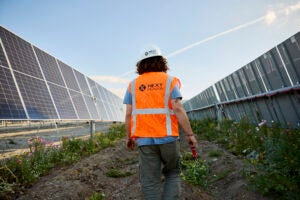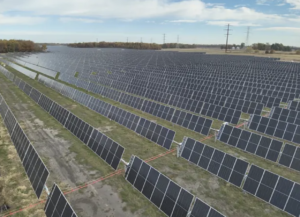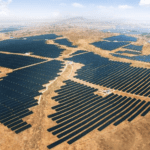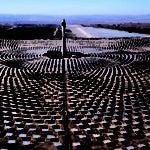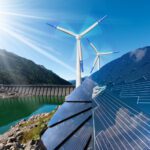Oman Adds Major Solar Project. A consortium consisting of Saudi Arabia-based ACWA Power, Kuwait-based Gulf Investment Corp., and Kuwait’s Alternative Energy Projects Co. in January inaugurated Ibri 2, the first solar independent power project to be launched under Oman’s national renewable energy program. The solar farm was connected to the national grid, and is contracted to produce renewable energy over a 15-year period for the Oman Power and Water Procurement Co. (OPWP). Officials said the project is part of the Oman 2040 Vision program, which includes making 20% of the country’s power from renewable energy by 2030, and up to 39% by 2040. Government officials also have said the program is designed to protect Oman’s natural resources. The Ibri 2 development, announced as a $417-million investment, represents a public-private partnership and is the latest project to attract foreign direct investment under the umbrella of the Omani Power Sector Regulation and Privatization Law. The project is currently Oman’s largest utility-scale renewable energy development and is designed to generate 500 MW of solar power. Construction was completed in 13 months. Two Oman-based companies, Taj Middle East and Diaa Energy, were contracted to build the mechanical installations. It is comprised of about 1.5 million bi-facial solar panels and extends across an area of 13 million square meters. ACWA Power has an additional seven power generation projects either operating or in development in Oman.
Hydro-Québec Purchases Output from Rivière du Lièvre Generating Stations. Hydro-Québec and Evolugen, the Canadian operating business of Brookfield Renewable, announced on Feb. 1 that they have entered into a 40-year escalating electricity purchase agreement under which Hydro-Québec will purchase the output from four generating stations with 263 MW of combined capacity located along Rivière du Lièvre in Outaouais. The facilities are expected to contribute approximately 1.5 TWh of energy annually. The assets will continue to be operated by Evolugen.
Irish Group Will Build Libyan Solar Farm. AG Energy, an independent power producer (IPP) based in Dublin, Ireland, in late January received a contract to build a 200-MW solar power facility in Ghadames, Libya. The project will be the first renewable energy installation in Libya led by an IPP. The contract was awarded by the Libyan Privatization and Investment Board and the General Electricity Co. of Libya (GECOL). Libyan officials have said the project could serve as a pilot for groups trying to attract private investment for renewable energy in the country. Libya has lagged other African nations in renewable energy development due to political instability over the past decade. State-owned GECOL is leading the formation of a working group trying to develop a plan for the country’s electricity sector that could be implemented over the next decade. TotalEnergies already has expressed interest in developing renewable energy in Libya, with plans to install as much as 500 MW of solar power generation capacity over the next few years through its Total Eren subsidiary.
UK Initiative Will Support EV Charging. Several UK-based groups recently launched a collaborative initiative, EVzero, to develop electric vehicle (EV) charging solutions in that country. The groups include Tesco, a multinational retailer; NatWest (the former National Westminster Bank), a major retail and commercial bank; and the Department for Environment, Food and Rural Affairs (Defra). The organizations are part of the Innovation Gateway program, focused on decarbonization projects and initiatives that “accelerate progress to net zero, through actionable programs and innovative technologies.” Innovation Gateway is bringing together groups to share best practices to facilitate the rollout of EV charging infrastructure across the UK. Others in the EVzero initiative, in addition to Tesco, NatWest, and Defra, are LeasePlan UK and The Environment Agency. EVzero will work to develop solutions to improve availability, efficiency, utilization, and financing on EV charging solutions, along with looking at ways to reduce investment risks and costs associated with corporate development of EV charging infrastructure. The UK government in late 2021 said all new homes and businesses built in the country starting this year will need to incorporate EV charging stations, supported by government funding.
Zimbabwe Establishes Renewable Energy Fund. The government of Zimbabwe has set up a fund devoted to development of renewable energy in the country, with support from the United Nations Fund for Sustainable Development Goals (SDG). Officials said the fund specifically targets investment in hydropower, biomass, and solar power. Zimbabwe authorities at the COP26 meeting in Scotland last year committed to reducing the country’s greenhouse gas emissions by 40% by 2030, and said they would look for opportunities to finance local renewable energy initiatives. The government said it would launch a fund of $45 million, starting in April, that would bring investments from the Infrastructure Development Bank of Zimbabwe (IDBZ); Old Mutual, the subsidiary of South Africa’s Old Mutual Investment Group (OMIG), which already is involved in solar power projects in Zimbabwe; and others including Zimnat Asset Management, the subsidiary of Zimnat Life Assurance Company. UN officials have said their SDG program “aims to mobilize private investment to support renewable energy projects to achieve the Sustainable Development Goals. In this sense, access to sustainable energy … will promote economic development, electrification, climate action, empowerment of women and youth, etc.,” in Zimbabwe.
Norway IPP Issues Green Bond Program. The European Bank for Reconstruction and Development (EBRD) announced its intention to subscribe to a $340-million green bond issued by Scatec, a Norway-based IPP. Proceeds from the bond issue will be targeted toward renewable energy development in Egypt, specifically the financing of six solar power plants—with total generation capacity of 380 MW—that Scatec operates in the Benban Solar Park, Egypt’s largest solar power installation and considered at present the fourth-largest solar farm in the world, with total capacity of 1,650 MW and annual output of about 3.8 TWh. The Benban park includes 41 solar facilities. Scatec has said it wants to diversify its portfolio of energy projects in Egypt, including producing hydrogen with electricity from renewable energy resources, that would be turned into green ammonia for export. Officials in announcing the bond issue in late January said it marks the first renewable energy-backed private sector bond in Egypt.
—Darrell Proctor is a senior associate editor for POWER (@POWERmagazine).



